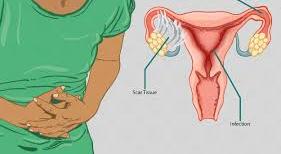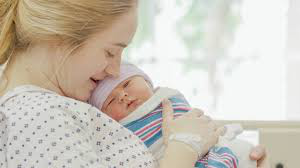How to Prevent Pelvic Inflammatory Disease(PID)after Childbirth?
Pelvic inflammatory disease refers to a variety of inflammation in your upper genital tract and surrounding tissues, mainly including endometritis, salpingitis, fallopian tube ovarian abscess, pelvic peritonitis. If you have pelvic inflammation after childbirth, there may be inflammation in only one part or in several parts at the same time.
The infection process usually starts with the bacterial infection from the vagina through the cervix, to the uterus and fallopian tube, and then spread through the fallopian tube to the whole pelvic cavity.

The pelvic inflammatory disease after childbirth is mainly caused by the following reasons:
1. Weak constitution and poor resistance.
2. If the doctor takes lateral perineal incision or other interventional operations during childbirth, this procedure is vulnerable to bacterial infection and causes pelvic inflammatory disease.
3. The cervical opening becomes slack, vaginal bleeding will last for a period of time, so bacteria are prone to cause ascending infection, resulting in pelvic inflammatory disease.
4. If there are residues in the uterus after delivery, such as placenta and membranes, it will also cause persistent vaginal bleeding and pelvic inflammatory disease.
5. If you are anxious to lose weight after delivery, using abdominal bands may also lead to pelvic bloodstream obstruction. Besides, if you are also on a diet, inadequate nutrition will lead to decreased resistance, so it is easy for PID to occur.
Cesarean section, prolonged spontaneous labor, use of forceps or fetal head aspirator to midwifery, premature rupture of membranes, multiple vaginal examinations, maternal obesity, anemia, lack of prenatal nutrition, premature recovery of sexual life after childbirth, etc., all of them are the potential causes of PID after childbirths.

Symptoms and Treatment
PID after childbirth has two types: acute and chronic type. The typical symptoms of acute type include fever, lower abdominal pain, excessive leucorrhea, and purulence. At the same time, patients will also feel weak and low back pain. In severe cases, you may also have a high fever, chills, headache, loss of appetite and so on.
If it is not treated timely and thoroughly in the acute stage, it will often transfer to chronic PID. Most of the systemic symptoms of chronic PID are not obvious. Low fever and fatigue may occur. At the same time, you will feel lower abdominal pain, low back pain and so on. The chronic pelvic inflammatory disease requires a longer time to treat, and it is easy to recur. Therefore, once patients found that they may have similar symptoms of pelvic inflammation, it is recommended to go to the hospital as soon as possible for diagnosis and treatment. However, conventional medication has side effects that can not be avoided, and the efficacy is difficult to reach the affected area. Laparoscopic surgery and so on also will cause post-operative sequelae and complications, and the recovery takes a long time.
Therefore, patients can try conservative natural medicine Fuyan Pill to treat. The prescription consists of various natural herbs. It has no side effects and can be taken for a long time. Its efficacy can reach the focus directly, sterilize and eliminate inflammation, and remove pathogens. At present, it is a relatively good method for the treatment of pelvic inflammatory disease.
Prevention
From the doctor's point of view, during delivery, doctors should pay strict attention to aseptic operation to minimize the risk of infection of postpartum pelvic inflammatory disease. If there is any residue in the uterus, the doctor should thoroughly clean it up for you.
From patients’ point of view, if you can take the following measures after delivery, you will be less likely to be infected with postpartum pelvic inflammatory disease:

1. First of all, you should have good antenatal care to avoid prenatal infection, such as vaginitis which needs to be treated in time.
2. Pay attention to the time of postpartum sexual life, do not start earlier than the time doctors predict.
3. Don't be anxious to lose weight and tighten the abdomen after delivery, wait for the uterus to shrink naturally, and pay attention to strengthening nutrition and avoid overwork.
4. If you are likely to be infected with the pelvic inflammatory disease after childbirth, or if you are physically weak, consult your doctor to see if you can take antibiotics preventively or take other preventive measures.
5. Before the 42-day postpartum examination, if you have any discomfort and other symptoms, it is advised to see a doctor immediately. Even if everything feels good, don't miss the postpartum review. The doctor will know if you have any postpartum pelvic infection and give you guidance accordingly.
Can Intrauterine Device(IUD) Cause Pelvic Inflammatory Disease?
previous pageWhat Can't You Ovulate Normally?
next page
You may also be interested in
- Daily Care Tips for Pelvic Inflammatory Disease Caused by Ureaplasma Urealyticum
- Treatment of PID
- Why Does Pelvic Inflammatory Disease Cause Fatigue? Don't Ignore These 5 Symptoms!
- Can Abnormal Vaginal Discharge Cause Pelvic Inflammatory Disease?
- Can Pelvic Inflammatory Disease Cause Intestinal Symptoms?
Testimonials
- Adenomyosis with Ureaplasma Urealyticum Cured by Fuyan Pill
- Tubal blockage with hydrosalpinx can be cured by TCM shortly
- Fuyan Pill Helps A woman with Adenomyosis Get Pregnant
- A Woman with Hydrosalpinx Is Cured with Fuyan pill
- Pelvic Inflammatory Disease Testimonials
- Irregular Vaginal Bleeding and Endometrial Thickening Cured by Fuyan Pill
- Pruritus Vulvae and Frequent Urination: Mycoplasma Infection Cured after 2 Courses



